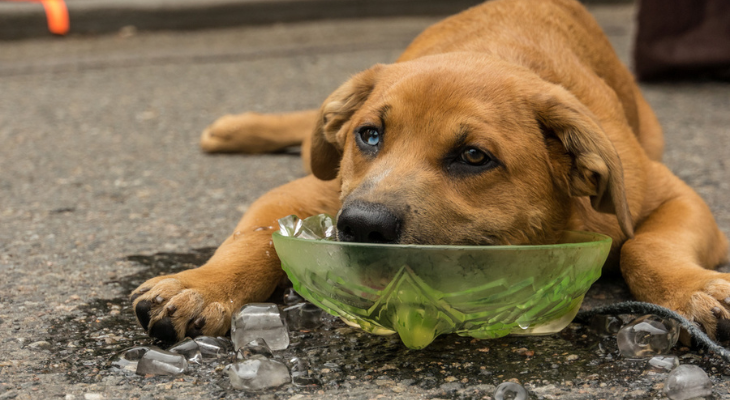
Protect Your Pets from Heatstroke This Summer
Hot, humid summer days could mean trouble for your pets if they become overheated. High temperatures and humidity levels increase your pet's risk of developing heatstroke, a potentially deadly condition.
What Is Heatstroke?
Heatstroke occurs when your pet's body temperature rises dangerously high. A temperature of 102.2 degrees or higher may mean that your pet is suffering from heatstroke, according to the American Animal Hospital Association (AAHA). Humidity is also a factor in heatstroke, as cases increase during hot, humid days
Which Pets Are at Risk of Heat Stroke?
Any mammal, human or animal, can develop heatstroke, including our furry friends. Although heatstroke is most often diagnosed in dogs, it can also affect cats, rabbits, guinea pigs and other small animals. Older or overweight pets, pets with heart or lung conditions, and dogs with short muzzles, like pugs and bulldogs, are more likely to develop heatstroke, according to the AAHA. Heatstroke can occur whether your pet is inside or outside.
Heatstroke is an emergency. Without prompt treatment, your pet could die.
What Are the Symptoms of Heatstroke?
You may notice some of these symptoms if you're pet has heatstroke:
- Drooling
- Panting
- Diarrhea
- Vomiting
- Red Gums
- Dry Gums
- Lack of Energy
- Trouble Breathing
- Falling Down or Stumbling
- Seizures
- Collapse
What Can I Do to Keep My Pet Safe from Heatstroke?
These tips can help your pet on hot, humid days:
- Make Shade a Priority. If your pet will be spending time outdoors, check your yard to ensure that there are plenty of shady spots to escape the heat. A dog house isn't a good shade solution. Dog houses hold in heat and increase your dog's risk of developing heatstroke.
- Provide Plenty of Water. Keep your pet's water dish full of fresh, cool water when it's hot and humid outside. Lack of water can quickly lead to dehydration.
- Limit the Amount of Time Your Pet Spends Outside. If being outside isn't pleasant for you on a hot, humid day, your pet won't enjoy it any more than you do. For your pet's sake, decrease the length of its outdoor breaks when it's hot and humid.
- Don't Leave Your Pet in a Parked Car. Spending time in a parked car, even with the windows partially open, can be deadly for your pet. The temperature outside your car may feel comfortable, but it's a very different story inside the car. When the outside temperature is 85F, the temperature inside the car rises to 102F in just 10 minutes, according to the Humane Society of the United States.
- Keep Your Home Cool. Turn on your air-conditioner to cool your home on hot or humid days. Fans may be helpful on cooler days but only push hot air around on sweltering days and can't reduce humidity like air-conditioners.
- Buy a Cooling Device for Your Pet. Cooling mats, beds, collars and bandanas will help your pet stay cool despite the climbing temperatures. Pet stores and websites offer a variety of cooling devices designed for your pet's comfort.
- Reschedule Exercise Sessions. Avoid vigorous play sessions or walks during the hottest parts of the day. Instead, reschedule these activities for dusk or dawn when it's likely to be cooler and less humid.
- Learn Heatstroke First Aid Basics. If your pet seems uncomfortable outdoors or is showing any signs of heatstroke, bring it indoors immediately. Wet towels in cool water, wring them out and place then on your pet's head and chest. If your pet is agreeable, a cool (not cold) bath can also be helpful. Be sure to offer a fresh supply of water too.
- Call Your Veterinarian. Although your pet may perk up once its inside, it's important to call the veterinarian as soon as possible. He or she can tell you if your pet needs to be seen. If your pet is struggling to breathe, collapsing or experiencing seizures, vomiting or diarrhea, don't wait to call. Go to your veterinarian's office or the nearest emergency veterinary office if it's after normal hours.
Are you concerned that your pet may have heatstroke or another health problem? Get in touch with us and tell us about your animal's symptoms.
Sources:
American Animal Hospital Association: How Can I Prevent Heatstroke in My Pet?
American Kennel Club: How Hot is Too Hot? Heatstroke in Dogs, 05/06/2021
The Humane Society of the United States: Keep Pets Safe in the Heat
